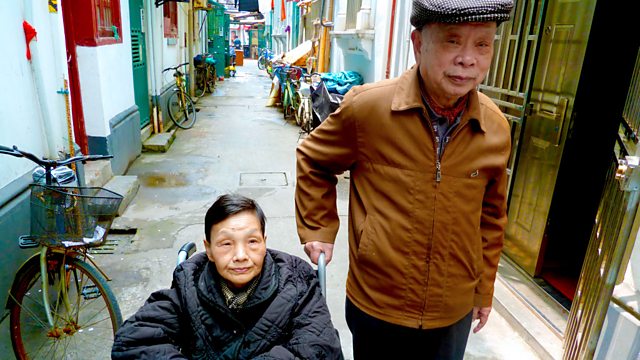China: Too Old to Get Rich?
China's natural ageing process has been accelerated by the one-child policy. Mukul Devichand asks if Shanghai's ageing population could be undermining economic growth.
In this week's Crossing Continents, Mukul Devichand tells the stories of Shanghai's rapidly ageing population.
China's natural ageing process has been accelerated by the One Child Policy. Mukul tells the stories of an ageing city and asks whether China's rapid economic growth could be undermined.
Shanghai's image is youthful and contemporary, of a globalised metropolis buying into a new lifestyle at chains like Ikea. But the Ikea Shanghai store is home to a different category -- and age -- of customer. The store canteen has become a meeting point for elderly singles, looking for love and friendship. It's a story repeated across Shanghai: in places you may expect to millions of young people, you'll see the elderly.
Like the rest of urban China, Shanghai is growing old. A quarter of the city's resident population is now retired, putting it in the same demographic league as countries like the UK or Germany. But ageing in China is different. Its fertility rates have dropped at a speed unprecedented in modern history because its "One Child" policy. 30 years after the policy started, the speed of ageing is faster in China than anywhere else. The burden of ageing is not only coming faster, it's also much also harsher here, because China is still a developing country -- with hundreds of millions of poor people to support, as well as hundreds of millions of additional elderly. That has led to a deep seated anxiety in China: will the country grow too old to get rich?
Nestled amid skyscrapers, Mukul tells the stories of the old Shanghai of inner city districts, a place of tumbledown old blocks where the elderly are concentrated. He meets the couples and families struggling with new complaints, such as dementia and alzheimers, under the burden of low incomes and limited welfare. This story of poverty amid plenty symbolises the deeper worry: of the expense of an ageing China in a country where elderly care has traditionally been managed by the family.
In the same city districts, public and private nursing homes are now opening their doors. These cater to a growing demand from families who can't manage the traditional custom of "many generations under one roof" and represent a big cultural change in China. But who will pay for this kind of care nationally? Mukul tells the stories of the rural migrants, caught between the gaps of China's welfare system -- the millions for whom such care is simply not an option.
What can be done? One solution is to encourage more babies in each family. But that is antithetical to China's historically draconian "One Child" family planning, which is now deeply entrenched in the culture. Mukul visits a family planning centre, which now encourages some couples to have more than one -- and finds the couples aren't always listening. He speaks to Shanghai's leading family planning officials to ask if they are changing the "One Child" policy, and how fast.
At its root, the real problem is not just too many elderly. Rather it's a shortage of young workers, threatening China's economic model itself. A lack of willing youth is a huge issue for a country whose entire business model is based on millions of cheap workers. In the industrial zones south of Shanghai, Mukul tells the stories of a crisis in labour. Will China's factory of the world collapse under the burden of ageing?
Last on
More episodes
Previous
Next
Broadcasts
- Thu 17 May 2012 11:00Βι¶ΉΤΌΕΔ Radio 4 FM
- Mon 21 May 2012 20:30Βι¶ΉΤΌΕΔ Radio 4
Featured in...
![]()
From China
A selection of programmes and clips relating to China.
Podcast
-
![]()
Crossing Continents
Stories from around the world and the people at the heart of them.



